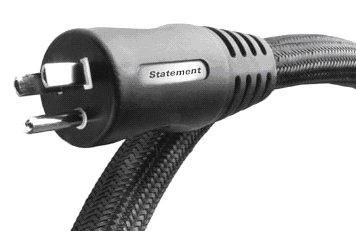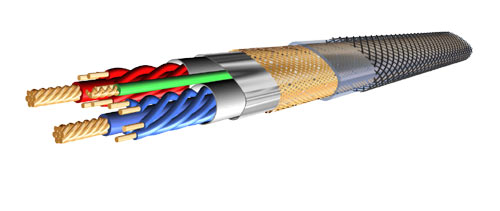|
You are reading the older HTML site Positive Feedback ISSUE 10october/november 2003
ps audio xStream Power Statement AC cables as reviewed by John Zurek
|
||
|
|
This is the first of three reviews of PS Audio's xStream cable products. Most of you are probably familiar with their acclaimed Lab series power cables, which have been around for several years. Based on what they've learned from building power cables, PS is now making interconnects and speaker cables. I will be reporting on Paul McGowan's top-shelf Statement power cables, interconnects, and speaker cables, both individually and as a system. The Bricks and Mortar of Power Delivery Since the folks at PS consider power to be the foundation of a good system, I thought I'd start with the power cable—or, as PS refers to it, power delivery system. What did PS do differently when they decided to make an all-out assault on the state of the power cable art? Everything! For starters, this cable does not use any off-the-shelf components. As they describe the process on their website: "To make the huge leap forward with our new delivery system, we… redesign[ed] every single aspect of the cable, including the connectors, the conductors, the shielding and the jacketing." Check the PS Audio site for the details.
I never really paid much attention to how power cables were built. They all looked like garden hoses—thick wire with high-quality connectors. The other day, however, I was pruning some bushes in my yard with a hedge trimmer and "D'ohhh!" I lopped off the industrial-grade extension cord near the male connector. It was off to Home Depot for me. While looking for a replacement, I noticed that they carried some of the high end, green-dotted, hospital-type male AC connectors, the same as the ones used in almost all aftermarket power cables. Though I could see a big difference in the quality of the hospital connectors versus plain-vanilla ones, the hospital connectors were similar to all of the audiophile power cables that I have seen, featuring stamped prongs with holes, steel screws, and brass parts. Check out the PS cables. No other power cable that I've seen looks like this—no holes, no screws, no brass. When the Statements arrived, I unpacked them from their boxes and cute velvet-like bags with drawstrings (like the bag a bottle of Crown Royal whiskey comes in—or so I've heard). I then spent the next hour soaked in sweat (it was an unusually warm fall day in the foothills of the Front Range), trying to hook up three of these monsters to an amp, preamp, and CD player. I once foolishly thought I had enough room in back of my component racks. Was I wrong! It was like wrestling with small anacondas, and they looked like them, too. These babies are built better than most of the mil-spec parts I've had my hands on over the years. The good news is that they were in place, the xStreams stayed there. Your System Needs Infrastructure for Coherence It was a huge pain, but the only way I felt I could do these power cords justice was to listen with my current cables, then switch immediately to the xStreams, so I listened, switched, listened, switched, etc. for each of the following examples, and many more not mentioned.
Next came "How ‘Come My Dog Don’t Bark When You Around" from Dr John’s Goin’ Back to New Orleans, the story of a cheating wife and a man's former best friend. With the xStream, the dog in question changed from a shadowy figure to a mad hound that roamed from stage left to right and back again, barking. I’ve listened to this tune many, many times, and never heard the hound cross back to stage left before! Trivial? You decide. Everything was much more logically integrated. The percussion—which I believe includes some galvanized pipe cut to different lengths and played with xylophone mallets—was killer. I could feel the mallet striking the pipes with much more attack and clarity. On the second listen, my cat got mad and bolted! Switching to vinyl, I put on Bernstein conducting Stravinsky’s Le Sacre du Printemps. This is where the Statement really showed its mettle. The orchestra went from sounding like musicians who played instruments to one of the finest orchestras in existence. There were just too many favorable differences to describe here. Timing, articulation, natural reverb. The stabbing of the triple-tongued trumpet attacks. The tympani exploding and, unusually, playing melody and harmony. The pagan night came alive in terrestrial joy followed by mystic terror. Once I switched to the xStream, I listened to the whole piece. I couldn’t let it go. Gotta remind myself to cue this record up again on March 21st for my own little rite. A Different Substructure Because I was using a PS Audio amplifier, I thought there might be a special synergy between amp and power cable, as is the case with many manufacturers, so I took one of the xStreams over to a friend's place and hooked it up to his non-PS Audio power amp. After ten minutes and four or five very diverse cuts, the owner was very impressed: "The highs are sweeter and faster, the bass is firmer, more extended, and better defined. I needed to turn the (Paradigm 18 servo) subwoofer down a little." Live Underpinnings I was doing a rehearsal with my jazz trio, and again brought the xStream along. We plugged it into the bass player's 300-watt, all-tube Ampeg SVT amplifier. Instantly, the sound was sweeter. Don't ask me to define this, but the bass lines had a better feel while I was playing—more distinct and fuller. We wanted to try it with the guitar amp, but it had a captive power cable. When we removed the cable from the bass amp, we all missed it. The bass player now wants an xStream. Very interesting. The Value of Laying the Proper Groundwork What did the xStream do for my system? It brought out detail, filled out textures, gave me more to listen to. The word "coherence" kept coming up. I was much more involved with the music, and never wanted to go back to my original power cords. It was equally impressive in other contexts, always positive and instantly noticeable. Want to build a small A-frame, a big Colonial, or a huge castle? Start with the proper foundation, and everything else will be much easier! I never expected so much performance from a power cable. It lays the groundwork upon which to build a proper system, and at the price, I'd call it a bargain. It makes music. John Zurek xStream Power Statement AC cables PS Audio
|



 First up was Delbert
McClinton’s "Somebody to Love You" from One of the Fortunate Few. My
first impression was that the xStream offered much smoother and more detailed highs. I
became aware of the Hammond organ that simply didn’t seem to be there before. Bekka
Bramlett's backing vocals became a voice, not just part of the mix. The bass, which was
what I expected to jump out, did not. It did, however, sound richer and better defined.
First up was Delbert
McClinton’s "Somebody to Love You" from One of the Fortunate Few. My
first impression was that the xStream offered much smoother and more detailed highs. I
became aware of the Hammond organ that simply didn’t seem to be there before. Bekka
Bramlett's backing vocals became a voice, not just part of the mix. The bass, which was
what I expected to jump out, did not. It did, however, sound richer and better defined.